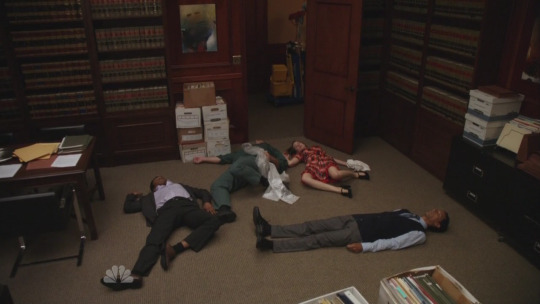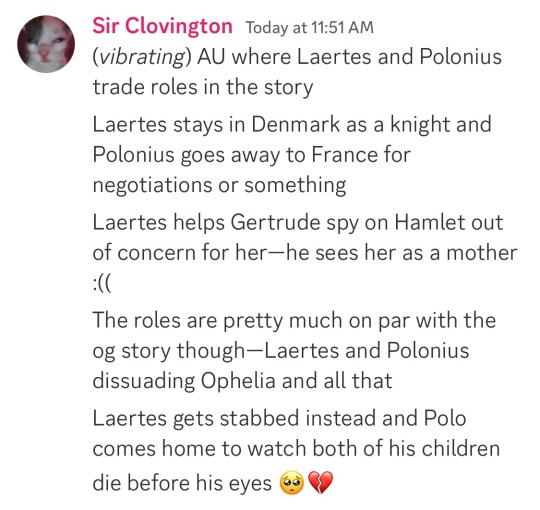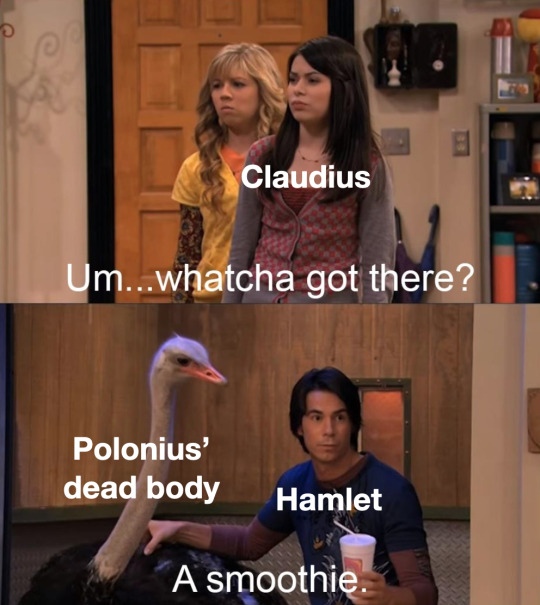#polonius
Text

#🤖#yes i know i took very clear insp from the noir + detective chat memes#but the thought of this was REALLY FUNNY#hamlet#horatio#hamlet x horatio#ophelia#laertes#king claudius#claudius#gertrude#polonius
964 notes
·
View notes
Text
feeling righteous anger on behalf of Laertes again
like he’s kind of a jerk to Ophelia at the start. but he’s also sort of right. and siblings are just Like That. they’ve only had each other and Polonius for their whole lives and goodness knows how many times they’ve come to each other to talk about Polonius behind his back or to cry on each other’s shoulder. or the teasing or inside jokes or Laertes trying to be the one to empathise with Ophelia being the only woman in the family because lord knows Polonius won’t.
when Laertes warns Ophelia to stay away from Hamlet, he expects her to ignore his warning. He’s not entirely opposed to the idea truthfully- the prince does seem to like her well enough. It’s not like he couldn’t see it working out. But he’s also both overprotective and filled with the brotherly need to remind her of how much he himself can get away with, and he knows what men are like, so he tells her to keep her distance. She laughs, and says she will in a tone that suggests she very much won’t.
When he leaves for France, after the occasional scarce letter from his father about the prince’s state, Laertes expects the worst upon his return.
except he thinks the worst is that he’ll come back to his heartbroken sister, crying in her bedroom, and she’ll tell him that he was right, and he’ll tell her that all men are jerks and arrant knaves and they all suck. and he’ll offer her a tissue and maybe a lighthearted jest at their father or the prince or men again or something to improve her mood and she’ll laugh, and eventually she’ll be okay.
When he learns his father is dead, something inside him goes numb. He tries to remember what he and Ophelia used to complain about, but he can't think of anything. Polonius was all they had, after all. And for all his flaws, Laertes loved him.
When he learns his father was murdered, he swears he'll have the head of the monster that killed him.
And when he gets back to Elsinore, when he hears of the circumstances surrounding his father's death and sees the state of his sister, he burns with an anger he never knew he was capable of.
When his sister's funeral is disrupted by the prince himself, claiming to grieve, claiming to have lost more than Laertes could even comprehend, Laertes finds his hands around his throat before he can even fully realise what's happening. How DARE he? How dare he put an end to what little service the king would allow to put his sister to rest? How dare he claim he ever loved her when his actions put her in the grave? How dare he pretend to have lost when he could not possibly understand what he put Laertes through? What he put Ophelia through?
It's only natural that less than two days later, he finds himself at the other end of a poisoned blade. A dirty play, Laertes knows, to stab at your opponent before the round starts, but Laertes is so beyond any sense of fairness or mercy by now. The prince is dead within the half hour, his sister and father revenged, justice served.
What he doesn't expect is the prince to take the blade out of his hands and return the blow. And as he bleeds, Laertes realises the fate he's resigned himself to.
What he doesn't expect is the look in the prince's eyes after his mother falls, holding her as she dies. It's a terrified, vulnerable, pained expression, the likes of which he's never seen on the prince. The kinds of emotion he was beginning to doubt the prince was capable of, even. But Laertes can see in his face that, strangely enough, they only seem to scratch the surface of some melancholy that runs bone-deep.
And of all things, Laertes can't help himself but be struck with a sense of empathy for the villain. He remembers how he felt after the death of his father. He knows how it feels to live without a mother.
He thinks of the desperation he himself felt to find out who was at fault, and he thinks about Claudius. He thinks about how quick Claudius was to encourage his vengeful plans. He thinks about how Claudius had the opportunity to stop his own wife from drinking poison, but said nothing. He thinks about how the prince acted towards Claudius in the time before he left the country. He thinks about how the prince was then, grieving over the death of his father.
Something starts to make sense.
There's not a full hour between them. Maybe, in these last moments, he won't be the only one avenged.
Laertes calls out to Hamlet and warns him of his fate, revealing Claudius' plan. Within less than a minute, the king is dead.
There never was enough time to get a further explanation from either party, but in the little time they had left, some understanding was had. Perhaps it was Laertes' empathy. Perhaps it was his realisations. Perhaps it was the dwindling clock, and the idea that he'd see his father and sister again soon.
He'd talk it out with Hamlet then. For now, his and his father's death did not come upon him, nor his on himself.
#hamlet#shakespeare#hamletposting#laertes#hamlet and laertes my favourite narrative foils#i'll be your foil laertes#ophelia#polonius#king claudius
55 notes
·
View notes
Text
So I went on a YouTube binge yesterday watching people talk about classic literature and I remembered Hamlet which I read for school like 5 or 6 years ago and I kinda didn’t get it but the internet (especially tumblr) seem to go buckwild for Hamlet and I’d like to understand
So please explain tumblr, why do people love Hamlet? (either the play or character is fine)
#I don’t mean this in a condescending way at all I promise#I like didn’t really get literature analysis until I graduated high school ngl :/#I’m a science math nerd tbh#I’m better at it now#I think just having real world experiences and being free to think for myself really helped me with that#hamlet#william shakespeare#shakespeare#Ophelia#Claudius#polonius#classic literature#classic lit#literature#theatre#plays#play#please reblog#the lion king
74 notes
·
View notes
Text
ROUND 1: DOOMGUY (doom) VS POLONIUS (hamlet)


256 notes
·
View notes
Text
I don't know who needed to hear this today but this is your reminder that Polonius 👏 From 👏 Hamlet 👏 Is 👏 Not 👏 An 👏 Idiot. Is he a genius? No. Does he think he's way smarter than he actually is? Yes. Does he love to run on at the mouth? Yes. But if you actually listen to what he's saying, listen to his speech to Laertes, especially, especially listen to his speech to Reynaldo, he's dumb like the fox. He's getting older now, but I think he was very good at gathering information for most of his life. And his actions reflect this. His telling Ophelia to dump Hamlet... It's patriarchy, obviously, and he's coming at it from a place of selfishness, his reputation, but the observation itself never seemed ridiculous to me. Like if I were Ophelia's friend I would also be telling her "you know he can't marry you right? You know he's gonna have to marry a princess? You know if he gets you pregnant you're totally fucking screwed right? Are you being careful? Do you promise you're being careful?" He's also... on Hamlet's trail you know? "Though this be madness; there's method in it." I think it's a better story if Polonius isn't a bumbling idiot but instead is a competent but aging advisor. It adds a layer of threat to story if Hamlet isn't running laps around a total idiot, but deftly staying ahead of a smart man who is sniffing him out.
56 notes
·
View notes
Text
Thinking more about the irony of the idea that Hamlet's flaw is inaction when - within the context of the play itself - whenever stuff really goes wrong, with the exception of the King's death and Claudius's usurpment of Hamlet, which happens before the play anyway...it's really when Hamlet does do something.
When the play starts out, we don't really have any reason to think that Hamlet is in any particular degree of danger (there is of course an argument that that would change if Claudius and Gertrude had a kid but the implications are all that she is too old for that)...with the exception of the impending threat of Fortinbras, which is a whole separate conversation but also really should be Claudius's problem to solve, not Hamlet's (in terms of where blame lies, not ignoring the material danger).
When stuff starts to go wrong is when Hamlet starts doing things...even the antic disposition and the pushing away of Ophelia is an action, which alienates the one person who might have been able to help him (I was about to write "other than Horatio" but the reality is that Horatio is a massive enabler and when Hamlet does stuff Horatio just sort of...goes along with it the whole time, until the deaths of Rosencrantz and Guildenstern, which I'll come to).
There is of course the argument that if, after the play, Hamlet had killed Claudius straight away things would have been....better? But there isn't really much evidence for that; we have no idea what would have happened, ultimately, but given the entire situation and set up the idea Hamlet would not be suspected of the murder and then what happens? He's just committed regicide...maybe it would have worked out but also maybe absolute chaos would break out.
And then ultimately, he doesn't kill Claudius....but then he really starts acting and he is impulsive as heck. He kills Polonius because he doesn't think to *pull back a curtain to check who's there first* and he kills Rosencrantz and Guildenstern on what basically seems to be an impulse (and is certainly not needed; he could have replaced that letter with literally any instruction other than "kill them"; this is also the first moment we see Horatio pause and not just act like "whatever Hamlet thinks is a good idea probably is a good idea" and realise that...no, this guy is losing it and this guy, when he acts, acts in a way that is unhinged, impulsive and dangerous)...and then ultimately he goes ahead with a dual that he obviously should have avoided and gets himself and two innocent (assuming we assume Gertrude is innocent or at least somewhat innocent here) people killed in the process.
And a lot of the idea that inaction is his flaw is based on the idea that killing Claudius would have fixed all of this but a. the chances that killing Claudius would have caused a whole load of problems of it's own is really high and b. the fact he didn't kill Claudius doesn't mean he inevitably was going to kill Polonius and Rosencrantz and Guildenstern...he could have still just looked behind the damn curtain and not sent the letter and even with the dual, whilst Claudius is manipulating the situation and is absolutely the person responsible for the deaths that happen...Hamlet still could have chosen inaction, which Horatio finally does push him to do - far too late in the day, but none the less Horatio becomes the person going "please, stop".
And that's essentially how I feel about Hamlet through really all of this play, when he is doing stuff, is that it's like "please just stop doing things! Every time you do anything you fuck it up! Please just go sit in the corner and don't touch anything!".
I don't really think the idea of a "fatal flaw" applies to Hamlet - it's not that kind of tragedy - but in as far as Hamlet has one, it's not his inaction...it's literally his drive to action and his inability to do that in a way that is tactical or well thought through (which is also something that stands in contrast to Fortinbras who is able to bide his time, take it slow, not rush into anything and ultimately comes out of all of this King).
#hamlet#hamlet x horatio#hamlet/horatio#ophelia#hamlet x ophelia#shakespeare#tragic danish boyfriends#polonius#rosencrantz and guildenstern#fortinbras
83 notes
·
View notes
Text
Hamlet in a nutshell:




#hamlet in a nutshell part II#hamlet in a nutshell ft community#nymphpens#dark academia#poets on tumblr#dead poets society#relatable#classic literature#william shakespeare#Shakespeare#hamlet#hamlet memes#horatio#classic literature memes#literature memes#community#community memes#community x classic literature#community x shakespeare#community x hamlet#Shakespeare memes#in a nutshell#hamlet in a nutshell#king hamlet#gertrude#ophelia#polonius
28 notes
·
View notes
Text

*on the verge of tears* I’m very normal what do you mean?
39 notes
·
View notes
Text
modern gertrude would be that karen mom who stops coming to pta meetings after she’s widowed but still mocks the other parents’ baked goods and also children behind their backs at every opportunity while be a flatterer to their faces. she gets offended when she finds out they replaced her as president because she never shows up. she goes back because she can’t stand the slight only to find out the others’ baked goods have surpassed hers. hamlet and laertes have a bakeoff instead of a duel. laertes gives himself food poisoning on accident, hamlet gives claudius and polonius food poisoning on purpose, gertrude drinks herself to unconsciousness, ophelia skips the meetings for a swim meet or something, hamlet “dies” via being banned from pta meetings, and horatio has to relay all this to fortinbras, who arrived late. do you understand what i’m saying here.
80 notes
·
View notes
Text
hey sorry i killed your boyfriend (?). yeah he's at supper now. no he's not eating, he's being eaten. worms are munching on him as we speak. you won't be able to find him but you'll probably smell his rotting corpse as you go up the stairs. that will probably take a month. ya sorry about that.
132 notes
·
View notes
Text
Seward, by saying "there is a method in his madness", he likens Renfield to Hamlet. He does so by quoting Polonius, who has been observing the "mad" Hamlet's behavior.
Jonathan, on May 16, while believing that he has been going mad (and prayed to God to preserve his sanity), quoted and likened himself to Hamlet. ("My tablets! Quick, my tablets! 'tis meet that I put it down")
So both Jonathan and Renfield are compared to Hamlet, in relation to madness.
#oh hamlet stabs polonius. hm...#re: dracula#dracula daily#jonathan harker#rm renfield#dracula#jack seward#shakespeare#Hamlet#polonius#william shakespeare
110 notes
·
View notes
Photo

134 notes
·
View notes
Text
"What do you read, my lord"




Words Words Words
Suggesting that what Hamlet is reading is meaningless.
There is no meaning because of the murder of his father.
#hamlet#polonius#shakespeare#words words words#its all meaningless#im not mad like hamlet#or am i?#david tennant
59 notes
·
View notes
Text
I like the meta jokes in Shakespeare

I like to imagine they got Julius' actor to play polonius and Croud went wild because it's the guy!!!
95 notes
·
View notes
Text









Inspired by this post
#hamlet#ophelia#laertes#horatio#claudius#gertrude#polonius#rosencrantz and guildenstern#name meanings#the ones I got for Claudius varies greatly#some of these I go insane over and others I just laugh at#ky’s gallery
49 notes
·
View notes
Text
version of hamlet where every time polonius talks it’s just white noise and the play continues around him
#hamlet#polonius#hire me im a director#shakespeare#bonus points if there's a violent record scratch when he dies
87 notes
·
View notes